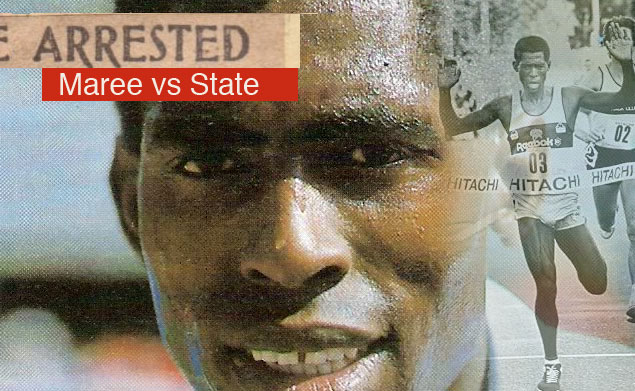
His feet pond the trash littered streets. His breath, turned a ghostly white by the cold South African air, comes in staccato bursts. Past the cars flipped on their sides during the riots the night before. Past the bullet ridded bar where the village “hard men” still harangue the bartender for one last drink. Past it all, he runs and runs. The crowing of a cockrel far off in the distance is the only accompaniment for the beat of his heart as he pushes himself to go faster.
Sweat trails down his ebony skin as the rising sun finds him cresting the final hill of his morning ritual. His pace eases off as it dawns on him, like it does every morning, that no matter how far or how fast he runs, the shadows will always keep pace with him. And not only those caused by the sun rising over sleepy shanty town..
The man that boy grew to be is named Sydnee Maree. And if you are not familiar with South African politics post 1994 or athletics pre-apartheid ceasure, his will not be a name that immediately sets bells ringing in your head.
It should be.
Sydney Marre was born in in a small town close to Soweto in 1956. Raised during a time when the apartheid policy was part and parcel of Maree’s upbringing. It was during this time that he developed his love of running, often relying on it to carry him to safety when bullets started to fly in a violent era for his home country. By 1976, Maree’s talent for running started to bring him to national prominence as he ran the first sub 4 minute mile ever recorded for a school boy.
This feat brought Maree to national prominence and saw him awarded South Africa’s “Black sportsman of the year award’. It also allowed Maree to come to America as part of a sponsored trip and eventually saw him earn himself a scholarship to Villanova university. Here, Maree would continue to develop under tutelage of renowned track and field coach Jumbo Elliot.
During his time at Villanova, Maree continued to wrack up awards with his feats on the running track garnering him All-America status for cross country and NCAA championships at the 1500 and 5000 meter distances (1980 and 1979 respectively).
The politics that had seen his father arrested for being associated with the fledgling ANC, and had seen his family forcibly removed from their land to eke out an existence in a township, continued to hold Maree back. International opposition to the apartheid policy meant that all South African athletes were ineligible from participating in international competition. As a result, the talented Murray would miss out on the opportunity to test himself against the best in the world.
It wasn’t until 1984, when Maree was granted America citizenship, that the world would finally get to see the South African compete. Maree obliged with US records in the 1,500, 2,000, 3,000 meter distances as well as wins at the Olympic games in 1984 and 1988. His feats made him one of the most dominant athletes ever to represent the United States by the time he hung up his racing spikes in 1991.
Things were changing at home as well. Nelson Mandela’s release from prison in February of 1990 would see the gears of reconciliation and recovery start to turn. Like other prominent South African athletes of the time, Maree returned home in 1995 to participate in the rebuilding process. His considerable international fame instantly made him an ideal poster child for the modern South Africa that the ANC was charged with delivering to an expectant population.
And if his story ended here, one would hail his life as a success story. Unfortunately, T.I.A and the political winds that carry one homeward can often carry one far out to sea.
In 2004, ironically the same year that Maree had been inducted into South African sports hall of fame, Maree was arrested and charged with fraud related to a $4.8 billion arms deal. The prosecution alleged that Maree had misused his position as head of the National Empowerment Fund (NEF) to influence the awarding of a no-bid contract to Deutsche Bank Securities. Maree was eventually found guilty and was sentenced to 10 years in prison without the possibility of appeal, late 2008.
A phoenix like rise to fame followed by a rapid descent into infamy. Perfect fodder for the national media that pulled no punches as they castigated Maree and by association the ANC government. Guilty before all the facts were brought to light, Maree did not stand a chance.
It would not be until a project named Maree vs State started by Maree’s son Daniel that Maree’s side of the story was told and the tangled web of political intrigue that had oft played a part in the former runners life started to unravel. The man who was portrayed as a thief by the media, started to look more and more like a scapegoat for the “big men” in the ANC.
A tale all too often repeated in modern day Africa. A place where more often than not, those that dare to fly close to the sun, are often burnt beyond recognition.

Latest posts by Zack (see all)
- Describe Africa to a child? - September 24, 2014
- Daddy what does it take to be an African Woman? - September 4, 2014
- acirfA rethoM - December 4, 2013







